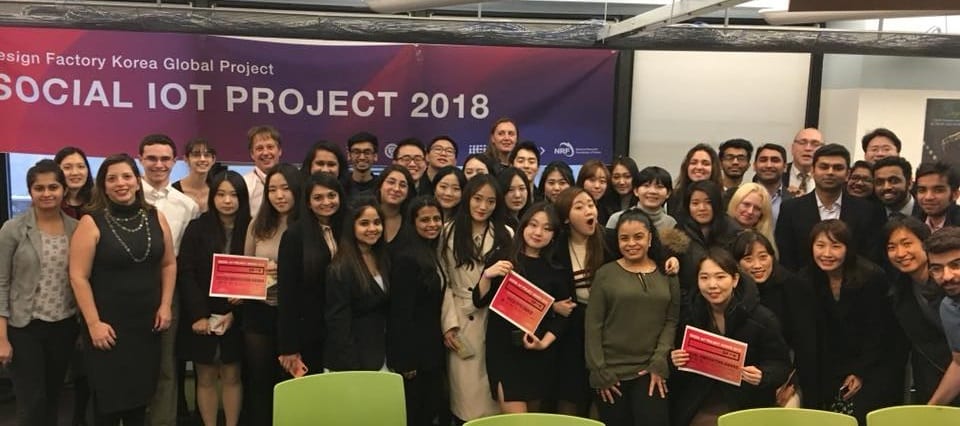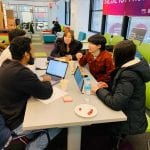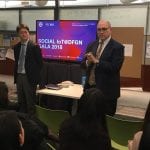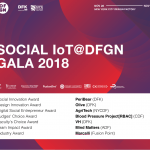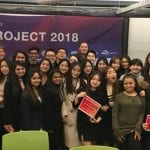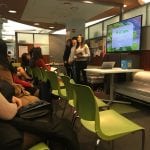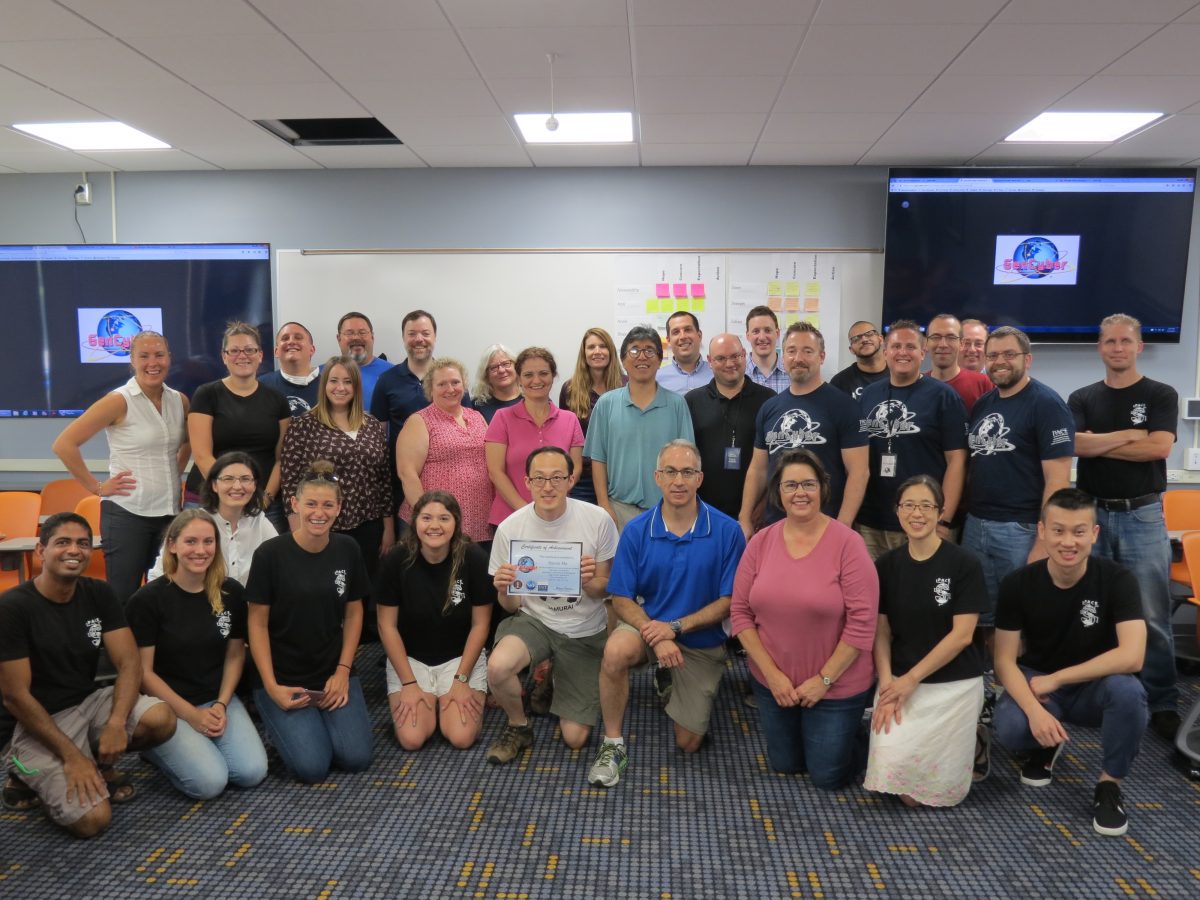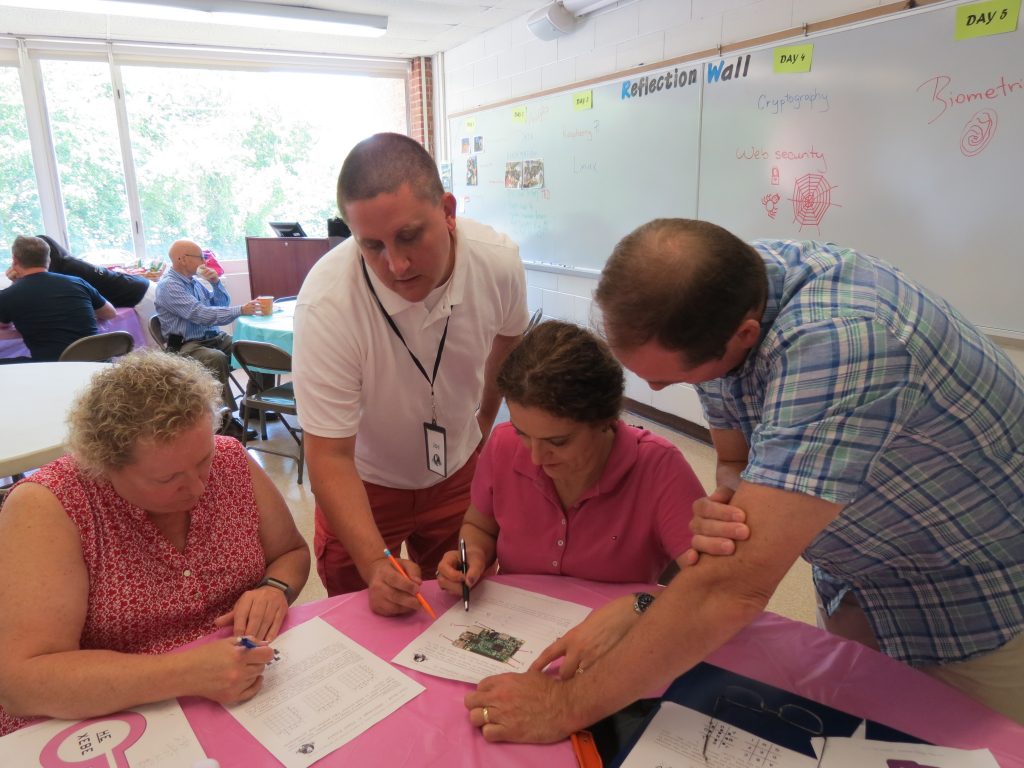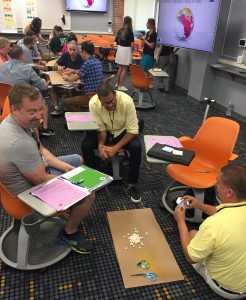For three consecutive days in November, the Seidenberg community got larger and more upbeat thanks to the visit of friends from places far away. As part of its commitment to provide students with transformative experiences, and to grow innovative and responsible citizens, the New York City Design Factory (NYCDF) at Pace University partnered with Design Factory Korea (DFK) at Yonsei University to pilot a project-based learning experience around the Social Internet of Things (IoT) theme.
The Social IoT Project, led by DFK, aims to encourage students to understand IoT technologies and connect these technologies with UN Sustainable Development Goals. Through this project, students have an opportunity to strengthen their social entrepreneurial skills for the 21st century, including complex problem solving; critical thinking; creativity; and social innovation. Students are encouraged to explore local interpretations of social issues, analyze and design an IoT based product or service, and validate and evaluate the social impact of its business model. As part of the project, student teams at DFK and at the project partner institutions, including Pace University, engaged in specific courses/projects to address a social problem of their choice. The solutions designed by the student teams, which aimed to integrate IoT or artificial intelligence components, were showcased as part of a gala which included project pitches and prototype demonstrations.
The Social IoT Student Gala featured 18 student teams from six design factories across the globe, for a total of 58 students! In addition to NYCDF (project host) and DFK (project lead), design factory (DF) and institution partners included: Aalto DF (Aalto University – Finland), Cali DF, DF Javeriana Bogota (Pontificia Universidad Javeriana – Colombia), and Fusion Point (Universitat Politecnica de Catalunya Barcelonatech – Barcelona).
Teams were judged and awarded based on several different criteria. Here are the winners!
- Social Innovation Award: PeriBear (DFK)
- Design Innovation Award: Olive (DFK)
- Digital Social Entrepreneur Award: AgriTech (NYCDF)
- Judge’s Choice Award: Blood Pressure Project [RBAC] (CDF)
- Faculty’s Choice Award: VH (DFK)
- Team Impact Award: Mind Matters (ADF)
- Industry Award: Marcalli (Fusion Point)
An Innovation Development Workshop led by the DFK team offered students and faculty the opportunity to work together to further iterate on the solutions developed and presented as part of the Gala. For the workshop, teams from different design factories were paired based on common goals. Two team pairs were recognized with the “Innovation Award” for their prototypes: AgriTech (NYCDF) & Smart Farmers (DFK), and Mirror Mirror on The Wall (NYCDF) & LIKA (DFK).
Last but not least, students and faculty were inspired by visits to NYC-based companies well-known for fostering innovation: SAP America, Intersection, Sidewalk Labs, Boston Consulting Group Digital Ventures and StackOverflow.
The Social IoT Project is one of a series of collaborative projects supported by the Design Factory Global Network (DFGN), a network of innovation hubs in universities and research organizations across five continents. DFGN “is on a mission to create change in the world of learning and research through passion-based culture and effective problem solving. Shared understanding and common ways of working enable Design Factories in the network to collaborate efficiently across cultures, time zones and organizational boundaries fostering radical innovations.”
“Through projects like the Social IoT we aim to plant and nurture innovative thinkers. Students learn by doing and build skills for careers that do not exist yet. The conditions for this kind of learning could not be achieved without like-minded partners such as DFK, the DFGN community, as well as friends from academia and industry. I am grateful to all for their commitment to drive change through passion-based learning in an interdisciplinary, international context,” said Andreea Cotoranu, Assistant Dean for Academic Innovation and Director of the NYCDF.
On this note, “gomabseubnida” (thank you) DFK, ADF, CDF, DFJB, Fusion Point and the bigger DFGN family for participating in the Social IoT pilot! We look forward to hosting the 2019 edition!
Our thanks also go to Ursuline Foley, and Suresh Kumar (Seidenberg Advisory Board members), and John Lynn, Partner and Co-Founder of The Studio Project, and Seidenberg’s entrepreneur in residence.
———————————————–
About: The NYCDF is a center for innovation and creative problem solving within the Seidenberg School of Computer Science and Information Systems at Pace University. NYCDF welcomes students of all majors, and across New York City and Westchester campuses!
NYCDF’s most popular projects include courses like Product Development Project (PDP), Product Innovation Project (PIP), and Challenge Based Innovation (CBI). As part of these 7-month long experiences, students travel to Helsinki (Finland), Graz (Austria) and Geneva (Switzerland) to develop solutions for challenges presented by industry clients. However, for students looking to understand what NYCDF is all about, check out CIS102Y Design Thinking and Innovation.
In addition to courses, the NYCDF supports other project-based experiences, such as the four-day Nexus Maximus or the 36-hour RAT Relay for Global Good, all designed to provide students with opportunities to learn by doing.
Students interested in NYCDF experiences can contact Andreea Cotoranu at acotoranu@pace.edu.


